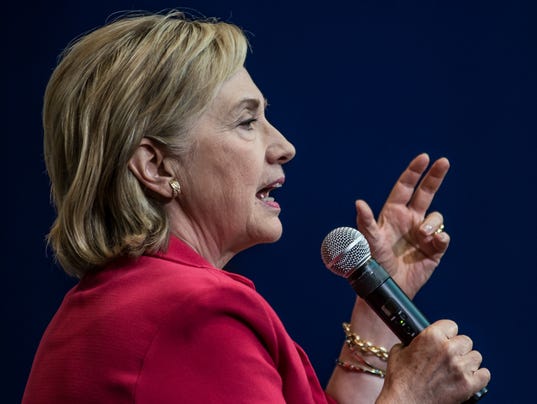WASHINGTON — Behind the scenes, Hillary Clinton's campaign for president belies the Wall Street reform rhetoric that she uses to appeal to left-wing Democratic voters.
It was Deep Throat's reputed advice to reporters in the Watergate scandal that made "follow the money" the iconic slogan for those seeking to ferret out corruption in U.S. politics.
But the political slush fund in Nixon's 1972 re-election campaign seems quaint in the wake of Citizens United, super PACs and the even darker pools of campaign funds that are the forms of corporate payoffs to politicians nowadays.
Much of the money is impossible to follow as dubious non-profit organizations mask the identity of their donors and the U.S. Chamber of Commerce fights efforts to make companies disclose their political contributions.
However, we can still see the tip of the iceberg through the tatters of campaign finance law that remain. And what that tip tells us is that Wall Street is still squarely behind Clinton.
Moreover, the drip feed of policy prescriptions that Clinton has embarked on (there's more to come "over the course of this campaign," she says) obscures the fact that there's not really that much reform there.
Her proposals for reforming capital gains tax by scaling up the amount of time it takes to get truly favorable rates, for instance, met mixed reviews. Some critics say it won't accomplish her stated goal of getting companies to look beyond quarterly profits.
In any case, it's small potatoes compared to forthright calls by her rivals for the Democratic nomination, Vermont Sen. Bernie Sanders and former Maryland governor Martin O'Malley , to break up the banks and impose more drastic restrictions on bank activity.
In fact, Clinton has rejected the idea of reintroducing a Glass-Steagall Act to separate commercial banks from investment banking, saying the issue is "more complicated" than that — echoing excuses by the Obama administration for not following through on more aggressive financial reform.
One of the things making it "complicated" might be the unstinting support Clinton is getting from Wall Street.
An analysis of the most recent federal campaign contribution data by the Huffington Post found Clinton in the lead in donations from Wall Street with $432,610 from bank executives, employees and their spouses.
Republican hopefuls Jeb Bush and Marco Rubio trailed with $353,150 and $105,669, respectively.
Again, this is the tip of the iceberg, because it doesn't include funds flowing into many super PACs and the very dark 501(c)(4) organizations like Americans for Prosperity that ostensibly promote social welfare but are shams for political advocacy.
This is on top, in Clinton's case, of the millions she and her husband, the former president, collected in "speaking fees" in the months prior to the official declaration of her candidacy, including from Goldman Sachs, JPMorgan Chase and other Wall Street firms.
These ties are well known, but the fact that this support continues in the face of Clinton's leftish rhetoric tells us Wall Street is not too worried about anything Clinton may do if she were to win the election.
This susceptibility to influence by mega-donors is not confined to Wall Street or financial services.


0 komentar:
Posting Komentar